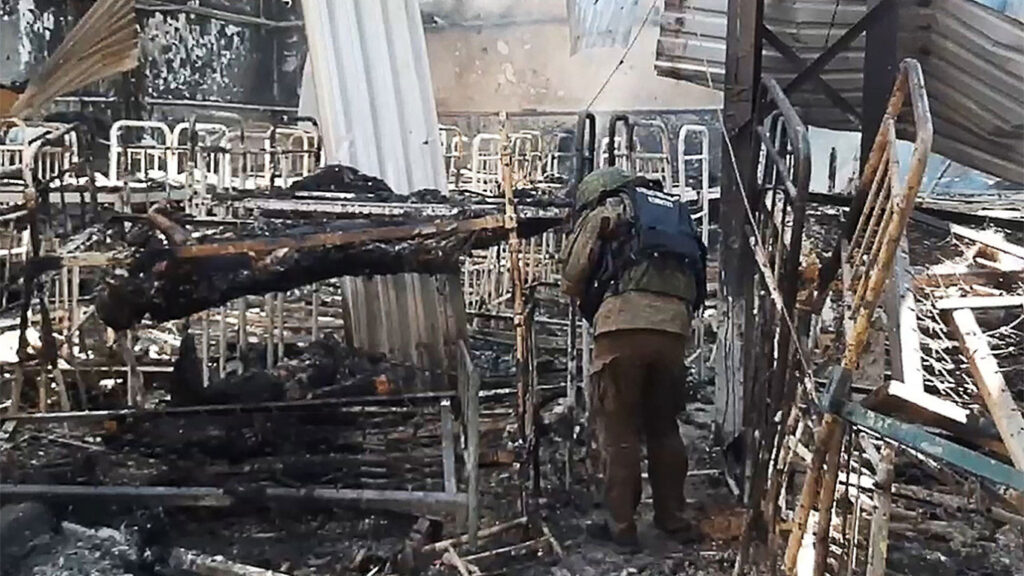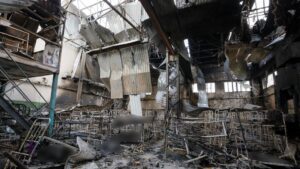
STRATEGIC ASSESSMENT. An attack on a prisoner of war camp in eastern Ukraine last week killed at least 50 Ukrainian prisoners of war, including fighters from Ukraine’s Azov Regiment who surrendered to Russian forces in the port city of Mariupol in May.
Details of what happened are disputed by both sides, and no independent investigators have yet been allowed to visit the site.
One of the few things known for sure is that the attack happened at Correctional Colony No. 120 in the self-proclaimed Donetsk People’s Republic (DNR) in the early hours of Friday morning — something stated by both Ukrainian and Russian officials.
Graphic footage of the aftermath posted by Russian state TV war correspondent Andrei Rudenko showed burned bodies and twisted metal bunk beds.
Moscow quickly said the prison was hit by Ukrainian rockets. But Kyiv blamed Moscow for the deaths, with Ukrainian President Volodymyr Zelensky later calling it a war crime.
Here’s what we know about the incident six days after the attack.
How many people were killed and injured?
Russia’s Defense Ministry said Friday morning that 40 Ukrainian prisoners were killed and 75 wounded. The ministry also said eight prison guards were injured.
However, at about the same time, the separatist DNR authorities put the death toll at 53, and said that no prison guards had been injured or killed.
Russia finally released a full list of casualties Saturday, which stated that a total of 50 Ukrainian PoWs were killed and 73 wounded.

Who was killed?
The Olenivka prisoners were Ukrainian soldiers and included members of the Azov Regiment that was set up in 2015 and known for its far right links. Azov played a key part in Ukraine’s two month defense of Mariupol against a significantly larger Russian force and the 2,500 soldiers who eventually surrendered were hailed as heroes in Ukraine.
As part of their justifications for the invasion Russian officials have characterized Azov fighters as Nazis and war criminals. On the same day as the Olenivka attack, the Russian embassy in the U.K. tweeted that Azov “militants deserve execution, but death not by firing squad but by hanging, because they’re not real soldiers. They deserve a humiliating death.”
What do Moscow and pro-Russian separatists say happened?
Russian officials have repeatedly claime that Ukrainian forces fired U.S.-supplied HIMARS rockets at the prison camp and deliberately killed its own prisoners of war to send a warning to Ukrainian soldiers and “prevent their surrender.”
Pro-Russian separatist officials said Friday that Kyiv had insisted that captives from the Azov Regiment be kept in Olenivka, implying Ukraine intended to target the facility.
“Political, criminal and moral responsibility for the massacre in Olenivka and other war crimes in Ukraine is directly borne by the [U.S. President Joe] Biden administration together with Zelensky,” Russia’s Defense Ministry said in a statement Tuesday.
DNR head Denis Pushilin claimed without evidence that the attack was a deliberate attempt to keep the Ukrainian prisoners from “testifying” about Kyiv’s alleged atrocities.
State television journalist Rudenko claimed the HIMARS strike took place at 2 a.m. when the prisoners were sleeping. “It wasn’t just artillery, there were HIMARS rocket launchers, a very precise weapon for murder… So, dear Ukrainians, what do you think of your leaders’ cynicism?” Rudenko said in a Telegram post on Friday.
Russian state media published a clip of fragments from a HIMARS missile that they said was found in Olenivka — but did not provide evidence connecting it with the prison explosions.
What does Ukraine say happened in Olenivka?
The Ukrainian military immediately denied Russia’s claims and, on Friday, accused Russian forces of directing artillery fire at the Olenivka prison “to hide the torture of prisoners and executions committed on the orders of the occupying administration.”
Later that day, the Security Service of Ukraine put forward a slightly different version, citing what it said were intercepted radio conversations as proof that the PoW deaths were likely caused by an explosion that originated inside the building.
The Ukrainian Defense Ministry said the killings were carried out by Russian mercenaries from the Wagner Group, and that one of the motivations may have been to hide evidence of torture and other abuses.
Ukrainian presidential adviser Mykhailo Podolyak tweeted Sunday that, according to satellite images, only one building in the prison camp was damaged and that photo analysis showed the destruction was caused by a “thermobaric explosion from the inside.” He also claimed that prisoners had been moved to the building where the explosion occurred only days before the incident — and that it was suspicious no prison guards were injured.
What was the Olenivka prison camp?
The Olenivka prison camp is located near the separatist-controlled city of Donetsk and has been used to house hundreds of Ukrainian soldiers who surrendered after bitter fighting in Mariupol. It is close to the front line, although the changing military situation means estimates of the exact distance vary from about 5 kilometers to 20 kilometers.
DNR authorities claimed Ukraine itself requested that its captive soldiers be held in Olenivka.
Little is known about Olenivka, which was used as an ordinary prison prior to the start of the Russian invasion. Open-source analyst Oliver Alexander highlighted videos from June that apparently show Ukrainian prisoners were not being housed in the building destroyed in the attack — suggesting that moving them there was a recent decision.
Prisoners who have been released from Olenivka describe torture and abuse.
“Almost every day we heard the beatings of prisoners of war,” Vitaliy Sytnikov, a Ukrainian civilian released from the camp, said in a Saturday interview with The New York Times.
At the same, state-controlled Russian media outlets have gone out of their way to stress that conditions at the site are satisfactory. The Russian Defense Ministry-run channel Zvezda, released interviews over the weekend with three wounded Ukrainian prisoners of war, who claimed they were treated well in Olenivka (Moscow Times)





